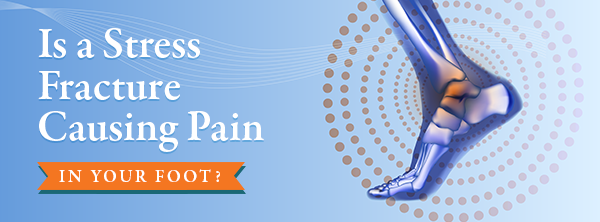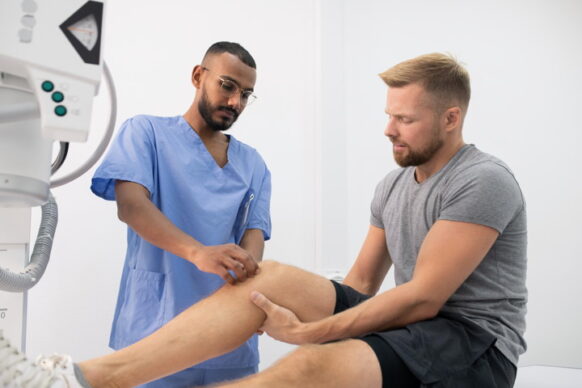Signs You May Have a Stress Fracture in Your Foot

As one of the most common repetitive activity or overuse injuries, especially in athletes and older individuals, a stress fracture in the foot can be a painful experience with the potential to cause long-term damage to the bones of your feet. Whether you’re young or old, an experienced athlete or just starting a new sport, hobby, or exercise regimen, a stress fracture can bring your activity to an abrupt and painful stop.
Here are some signs and symptoms that may indicate the presence of a stress fracture in the foot, some initial care suggestions to keep your foot stabilized until you can see a doctor, and what medical treatments may be available to get you back on your feet.
What is a Stress Fracture?
Typically caused by overuse and repetitive activity, a stress fracture occurs when a bone develops a small crack or severe bruising. Unlike a sudden fracture as a result of a fall, impact, or other sudden trauma, a stress fracture develops over time as repetitive forces cause microscopic damage to the bone tissue.
With the considerable pressure that even day-to-day life puts on the bones of the feet, it’s not surprising that most stress fractures occur in the foot, most particularly in the metatarsal bones. While the second and third metatarsals are usually at the highest risk of stress fracture, nearly any bone in the foot can suffer a stress fracture.
What Causes a Stress Fracture in the Foot?
There are countless reasons why a person might suffer a stress fracture in their foot, but the most common are:
Sudden Increase in Activity
If you’re a trained, conditioned athlete, a sudden increase in your training schedule, or a sudden resumption of activity after a long period of inactivity can lead to a stress fracture. For non-athletes, the adoption of a new physical activity (like taking up pickleball) or a periodic increase in activity (walking more than usual while on vacation) can lead to a stress fracture.
Bone Insufficiency
While we typically associate osteoporosis and weakened bone structure with the elderly, bone density can be reduced at any stage of life due to certain medical conditions, medications, or dietary insufficiency. Even the change to winter’s shorter days can increase one’s risk for stress fractures due to the decreased amount of Vitamin D synthesized by one’s body.
Changes or Improper Techniques in Activity
Changing one’s physical activities, or failure to use proper techniques and equipment can also lead to stress fractures:
- Changing from a soft exercise surface (treadmill, indoor track) to a hard or uneven surface (roads, rocky trails)
- Failure to properly train by gradually building up to the desired level or duration of exercise
- Failure to observe correct technique for impact exercises and activities that involve the foot
- Wearing improper or overly worn shoes that don’t correctly cushion your feet for the activity you’re performing.
Signs of a Stress Fracture in Your Foot
There are a few symptoms that are common to stress fractures of the foot, including:
- Pain that increases during activity, but subsides when you’re at rest and not putting weight on the foot
- Swelling on the top of the foot or outside of the ankle
- Tenderness
- Bruising
Pain from a stress fracture is not usually sudden, like pain from an acute fracture. Rather, the pain develops slowly as the stress fracture slowly worsens over time.
What To Do If You Think You Have a Stress Fracture
If you have any of the above symptoms and suspect you may have a stress fracture, you should seek medical attention as soon as possible. Failure to have the stress fracture properly treated could result in a more compound fracture, which could require extensive surgical repair and take you off your feet for an extended period.
Until you see a medical professional, treat the fracture by following the RICE protocol:
- Rest: Stay off the foot as much as possible, and if you must put weight on the foot, wear the most supportive shoe possible. Pay attention to the amount of pain each action causes – the more pain, the more stress you’re putting on the fracture site.
- Ice: Ice the fracture with a cold pack as soon as possible after it occurs. Apply the cold pack for 20 minutes at a time, several times a day. Never apply ice directly to your skin.
- Compression: Wrap the foot with a soft bandage to help reduce swelling.
- Elevation: Rest with your foot raised above your heart as often and as long as possible.
How Will OrthoGeorgia Treat My Stress Fracture?
Most stress fractures can be treated nonsurgically. Our team will use X-ray and other medical imaging to determine the location and scope of the fracture and determine the best course of treatment for your injury. Therapies may include:
- Activity modification: Patients with stress fractures in their foot may be advised to modify their activities for 6-8 weeks while the injury heals. Low-impact activities like swimming and cycling may be permitted, while activities that stress the foot – running, walking, jumping, etc. – will be limited or cut out entirely.
- Therapeutic footwear: Protective footwear such as stiff-soled shoes, wooden-soled sandals, or a removable short-leg fracture brace shoe may be recommended.
- Casting: Some fractures may require a cast to immobilize the foot and remove stress from the injured foot.
Some stress fractures will require surgical treatment, including the insertion of pins or other infixing hardware.
OrthoGeorgia is the only orthopaedic practice in central Georgia with a Foot and Ankle sub-specialty. At our Foot and Ankle Center of Excellence, our specialists are skilled in all aspects of orthopaedic care for the foot and ankle. When you see one of our providers, they will build a specialized treatment plan to help manage and alleviate the symptoms of stress fractures as well as other foot issues, including:
- Achilles Tendinitis
- Hallux Rigidus
- Bunions
- Ankle Fractures
- Calcaneus (Heel Bone) Fractures
- Arthritis
- Hammer Toe
- Claw Toe
- Morton’s Neuroma
- Heel Pain
- Ankle Sprains
- Metatarsal Fractures
- Plantar Fasciitis
- Turf Toe
- Talus Fractures
- Tarsal Tunnel Syndrome
- Toe Fractures
- Flat Feet
- Lisfranc (Midfoot) Injury
Is a Stress Fracture Causing a Pain in the Foot? Call Us at (478) 745-4206 Today!
Disclaimer: The information contained within this material is intended for informational purposes only. No material in this content is intended to be a substitute for professional medical diagnosis, treatment, or advice. Always seek the advice of your physician or other healthcare provider with questions regarding your medical conditions and treatment options.

Personalized Orthopaedic Care in Central Georgia
At OrthoGeorgia, we want to help you live a healthier and more comfortable life by giving those in Macon, Warner Robins, Kathleen, Milledgeville, Dublin, Hawkinsville, and the surrounding areas convenient access to the highest quality care. Whether you have been suffering from a sports injury or a common orthopaedic condition, we will determine the cause of your discomfort and craft a personalized treatment plan to bring you relief. To learn more about our services and our physicians, or to schedule an appointment at OrthoGeorgia, please contact us today.







